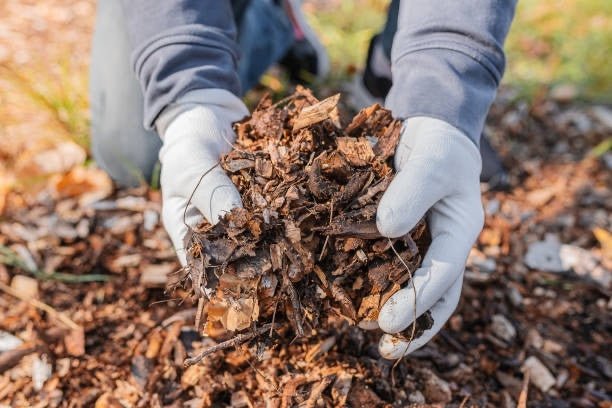Ways To Recycle Your Food Waste As Fertilizer
By Ruby Clarke
Author bio: Ruby is a former chef and now working for an SEO Consulting Company. She with a keen eye for business and financial startup information. She spends her spare time reading, watching crime series, and cooking at home.

If you are looking for a way to reduce the amount of food waste you produce and contribute to eco-friendly practices, look no further. Recycling your food scraps as fertilizer is an easy, efficient way to put your leftovers to good use, especially in your metal raised garden beds. In this blog, we'll walk you through the various ways to recycle your food scraps, from composting to vermicomposting.
Why Recycle your Food Scraps?
Food waste is a major contributor to global greenhouse gas emissions. In fact, the United Nations estimates that one-third of all food produced for human consumption is lost or wasted annually. Not only does this amount of waste take up valuable resources, it also contributes significantly to global climate change. By recycling your food scraps into fertilizer, you can do your part to reduce food waste and its associated negative environmental impacts.
Composting
One of the most straightforward ways to recycle your food waste as fertilizer is by composting. Composting is a natural process that involves breaking down organic matter into nutrient-rich soil, which can be used to fertilize plants and gardens. To get started with composting, you’ll need a bin or container, soil, oxygen, and a mixture of green and brown materials. Green materials are nitrogen-rich and include food scraps such as vegetable peelings, fruit cores, coffee grounds, and eggshells. Brown materials are carbon-rich and include dried leaves, newspaper, sawdust and wood chips.
Once you have your bin ready to go, you’ll need to add the green and brown materials in layers, alternating between the two. Make sure to sprinkle some soil over the top of each layer to help the decomposing process along. Finally, keep your compost bin moist but not soggy and give it a good stir every few days. In a few weeks or months, you’ll have nutrient-rich soil that can be used to fertilize your plants and garden.

Vermicomposting
Another way to recycle your food scraps as fertilizer is by vermicomposting. Vermicomposting involves using worms to break down organic matter into rich, nutrient-dense soil. To get started with vermicomposting, you’ll need a bin, worms, and a mixture of green and brown materials similar to composting. Once you have your setup ready to go, add the green and brown layers in alternating fashion as you would for composting. Make sure to keep your container moist but not soggy, and give it a good stir every few days. In a few weeks or months, your worms will have broken down the organic matter into rich, nutrient-dense soil that can be used to fertilize your plants and garden.

What are the Advantages and Disadvantages of Composting and Vermicomposting?
Composting has several advantages. It is an easy, inexpensive way to recycle food scraps, it doesn’t require any special equipment or tools and takes relatively little time and effort. Additionally, composting can reduce the amount of waste sent to landfills and can help to improve soil structure and fertility in the raised beds.
Vermicomposting has several advantages as well. It is an efficient way to recycle food waste, takes less time than traditional composting, and produces nutrient-dense fertilizer that is ideal for gardens or indoor plants. Additionally, vermicomposting doesn’t require large amounts of space or as much stirring and maintenance as traditional composting.
The main disadvantage of both methods is that they take some time and effort to set up and maintain. Additionally, composting and vermicomposting can lead to unpleasant odours and attract unwanted pests if not managed properly.
How Can You Make Sure That Your Compost and Vermicompost are Safe For Use?
To ensure that your compost or vermicompost is safe to use, you should always follow the instructions on the packaging of your fertilizer. Additionally, be sure to wear gloves when handling any organic matter and wash your hands thoroughly after each use. Furthermore, due to potential health hazards, vermicompost should be kept away from children and pets. Finally, make sure that you don’t add any contaminated materials such as meat scraps, dairy products or pet droppings to your compost bin or worm bin.
Are there any other ways to recycle food waste as fertilizer?
Yes! You can also use Bokashi, a type of fermentation process which uses micro-organisms to break down food waste into compost. This method is easier than traditional composting and vermicomposting in that it doesn’t require any stirring, mixing or maintenance – all you need to do is sprinkle a layer of Bokashi over your food waste and let it sit for two weeks. After two weeks, the food waste will be converted into nutrient-rich soil that can be used as fertilizer.
Additionally, there are several other methods for recycling food waste, such as composting tea and aquaponics. Let's take a look at them in more detail.

Compost Tea – Compost tea is a liquid fertilizer made by steeping compost in water overnight and then straining the mixture. This liquid can be used to fertilize your garden or indoor plants, as well as a preventative measure against plant diseases.
Aquaponics – Aquaponics is an innovative way to recycle food waste as fertilizer. In this method, fish and plants are grown together in a closed system. Fish waste provides nutrients for the plants, while the plants filter and clean the water for the fish. This is an excellent way to make sure that your food scraps don’t go to waste!
Garden Work:
The final way to recycle food waste is by using it in your garden. You can spread food scraps directly on the soil or use them to create a compost pile. This method doesn’t require any special equipment and is an excellent way to fertilize your garden without spending any money. If you're clearing your garden but you're not able to recycle everything, hiring a skip can be an effective way to ensure your waste gets disposed of. If you're hiring a skip, you may be wondering how much it'll cost. For more information and top tips, take a look at 'How much is a large skip to hire?' and you’ll learn more about skip and proper disposal.
Conclusion
Recycling food waste as fertilizer is a great way to reduce the amount of waste sent to landfills and help to improve the health of your garden or indoor plants. Whether you choose traditional composting, vermicomposting or one of the other methods mentioned above, you can be sure that you’re taking an eco-friendly step towards a healthier environment. So get started today – your plants will thank you for it!




